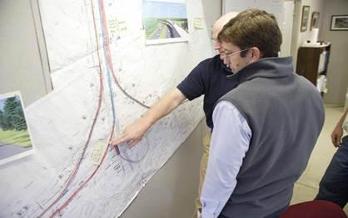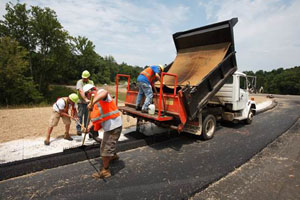Land Developers Information Center
Information and Resources for Land Use
 This page is intended for the use of companies, localities and organizations which propose to develop land, construct new roads and gain access to roads within the Virginia system of highways.
This page is intended for the use of companies, localities and organizations which propose to develop land, construct new roads and gain access to roads within the Virginia system of highways.
This land use work most often involves subdivisions, commercial, industrial and mixed-use developments and activities.
This page will also announce all Virginia Department of Transportation (VDOT) policy and process changes related to land use.
It has been organized to follow the general development process which includes:
- VDOT land use regulations
- Plan review
- Pre-construction, construction and inspections
- VDOT Instructional and Informational Memorandums
If you have questions or comments regarding VDOT and land use, send them to [email protected].
If you have questions about Broadband Coordination
VDOT Land Use Regulations
- Traffic Impact Analysis (TIA)
The purpose of TIA is to assess the impact of proposed changes in land use associated with a development on the surrounding/adjacent transportation network in Virginia.
http://www.virginiadot.org/info/traffic_impact_analysis_regulations.asp
- Arterial Preservation Program
The Arterial Preservation Program is designed to preserve and enhance the safety and capacity of the critical transportation highways included in the Arterial Preservation Network.
https://www.virginiadot.org/programs/vdot_arterial_preservation_program.asp
- Signal Justification Report (SJR) Requirements: https://www.virginiadot.org/business/resources/IIM/TE-387_Signal_Justification_Reports.pdf
- VDOT Junction Screening Tool (VJuST): https://www.virginiadot.org/innovativeintersections/#junctionscreening
- Access Management
With the goal of reducing traffic congestion and enhancing public safety by reducing crash rates, access management regulations contain the standards for the design of intersections, turning lanes, entrances, and for the spacing of entrances, intersections, traffic signals, median crossovers that apply to all state highways. Note that the AM-E form on the webpage is dated 2015 and still references Bradley Shelton and should be updated.
http://www.virginiadot.org/info/access_management_regulations_and_standards.asp
- Secondary Street Acceptance Requirements (SSAR) – Effective July 1, 2009
The SSAR requirements apply to all constructed streets intended to be maintained by VDOT as part of the secondary system of state highways.
http://www.virginiadot.org/info/secondary_street_acceptance_requirements.asp
- Subdivision Street Requirements (SSR) – Developments approved prior to July 2009
This document is intended for users of VDOT’s Subdivision Street Requirements for the development of new subdivision streets to be maintained by VDOT.
http://www.virginiadot.org/projects/ssr-rev.asp
- Land Use Permits
Land use permit regulations set forth the rules that individuals, localities, and other entities must follow in order to conduct activities other than travel on the commonwealth's highway systems that are under VDOT jurisdiction.
These include activities such as installation of utilities, construction of private and commercial entrances, landscaping, the temporary use of the right of way, as well as numerous other types of activities.
http://www.virginiadot.org/business/bu-landUsePermits.asp
Plan Review
- Plan Submittal Checklist
List of necessary details and documents to identify if plans have correct information prior to plan review
http://www.virginiadot.org/info/resources/landdev/Land_Use_Plan_Submittal_Checklist_June_2016.pdf
- Development Plan Checklist
To be used by both persons developing plans and VDOT staff to identify if correct information and details are contained within plan
http://www.virginiadot.org/info/resources/landdev/Land_Use_Development_Plan_Checklist_June_2016.pdf
- VDOT Hydraulic Calculations Plan Checklist
Comprehensive list of drainage design data required for plan analysis
Form LD-268 found in the VDOT Drainage Manual. The Roadside and Median Ditch Design Form is used for computing depth, velocity, and channel lining.
http://www.virginiadot.org/business/resources/LocDes/DrainageManual/chapter7.pdf
- Department of Rail and Public Transportation Multimodal System Design Guidelines
A resource for local planners, engineers, designers, policy and decision makers and anyone else engaged in multimodal planning throughout Virginia.
http://www.drpt.virginia.gov/media/1056/guide-for-preparing-a-multimodal-system-plan.pdf
- Manual on Uniform Traffic Control Devices (MUTCD) and Virginia Supplement to the MUTCD
The MUTCD is a document issued by the FHWA of the USDOT to specify the standards for traffic signs, road surface markings, and signals are designed, installed and used.
http://www.virginiadot.org/business/virginia_mutcd_supplement.asp
- Virginia Work Area Protection Manual
The Virginia Work Area Protection Manual provides the most current standards, guidance, options, and support for the design, application, and implementation of temporary traffic control devices on roadways in Virginia.
This manual will govern traffic control during construction, maintenance, utility, permit, and emergency operations on all state maintained roadways.
The Virginia Work Area Protection Manual is based on the Manual for Uniform Traffic Control Devices for Streets and Highways.
https://www.virginiadot.org/business/trafficeng-WZS.asp
- Road Design Manual
This manual is the principle document for use in the geometric design of primary and secondary roadways in Virginia. The Road Design Manual was created to promote uniform design procedures for all designers and technicians involved in the development of plans for Virginia highways.
The Road Design Manual includes a broad range of guidance from preliminary scoping considerations to in-depth plan assembly instructions.
https://www.virginiadot.org/business/locdes/rdmanual-index.asp
 Road Design Manual – Appendices
Road Design Manual – Appendices
- Appendix A1 – Design Guidelines
Appendix A1 contains geometric standards for roadway design. VDOT design standards are based on AASHTO A Policy on Geometric Design of Highways and Streets (otherwise known as the “Green Book).
While the state of Virginia has officially adopted the 2011 AASHTO Green Book as the minimum design standard, Appendix A provides the minimum design standards for use in the development of state highways.
https://www.virginiadot.org/business/resources/LocDes/RDM/Appendix_a1.pdf
- Appendix A(1) – VDOT Complete Streets: Bicycle & Pedestrian Facility Guidelines
This section includes Bicycle and Pedestrian Guidelines previously incorporated in Appendix A. The information has been consolidated with other information for Complete Streets including Bus Stop Design and Parking Guidelines.
https://www.virginiadot.org/business/resources/LocDes/RDM/Appenda1.pdf
- Appendix B – Subdivision Street Design Guide (SSR) – After July 1, 2009 used only for grandfathered developments:
This section of the Road Design Manual is intended to be used in conjunction with the VDOT Subdivision Street Requirements for the development of subdivision streets that will be accepted in the secondary roadway system. Appendix B was replaced by the Secondary Street Acceptance Requirements on March 9, 2009.
http://www.virginiadot.org/business/resources/LocDes/RDM/appendb.pdf
- Appendix B(1) – Subdivision Street Design Guide (SSAR) – Effective July 1, 2009:
This appendix is intended to be used with the Secondary Street Acceptance Requirements (SSAR) for the development of new residential and mixed-use streets functionally classified as “local” streets that will be accepted in the secondary roadway system. SSAR became effective on March 9, 2009.
http://www.virginiadot.org/business/resources/LocDes/RDM/AppendB1.pdf
- Appendix B(2) – Multimodal Design Standards for Mixed-Use Urban Centers
Appendix B(2) serves to provide interested localities an optional mechanism to implement the Department of Rail and Public Transportation’s (DPRT) Multimodal System Design Guidelines and to establish multimodal design standards for mixed-use urban centers.
http://www.virginiadot.org/business/resources/LocDes/RDM/AppendB(2).pdf
- Appendix F – Access Management Design Standards for Entrances and Intersections:
This section of the Road Design Manual provides geometric design and spacing standards for entrances and intersections on state maintained roadways. The goal of Access Management is to balance access to land adjacent to the roadway while simultaneously preserving the flow of traffic on the surrounding roadway system.
http://www.virginiadot.org/business/resources/LocDes/RDM/AppendF.pdf
- Traffic Volume Data
VDOT conducts a yearly traffic volume count on primary roadways in Virginia. Traffic volume counts are obtained on 20 percent of secondary roadways annually, which roughly equates to secondary roadways being counted every five years.
This traffic date is provided to the general public and can be found on the VDOT Traffic Engineering Division web pages.
http://www.virginiadot.org/info/ct-trafficcounts.asp
- Crash Data for Virginia IT Infrastructure Partnership
Crash data is critical for the evaluation of the roadway system and to determine where public safety projects should be considered.
VDOT has access to the state and local law enforcement accident reports that pertain to the highway system. It is the goal of VDOT to make general crash data available to the public.
- VDOT Drainage Manual
The VDOT Drainage Manual is intended as an operational handbook for use in hydrologic and hydraulic analysis. This manual includes design concepts, policies, procedures and examples for designers in plan development of VDOT highways.
http://www.virginiadot.org/business/locdes/hydra-drainage-manual.asp
- VDOT Road and Bridge Specifications
The Road and Bridge Specifications are intended to be the standard for contracts awarded by the Commonwealth Transportation Board or the commissioner of highways. However, this document is very helpful in providing guidance on the materials and procedures for placement of items in the right of way.
The Road and Bridge Specifications include detailed information regarding the receiving of materials on site, handling and placement in accordance to the applicable standards.
http://www.virginiadot.org/business/manuals-default.asp
http://www.virginiadot.org/business/const/spec-default.asp
- VDOT Road and Bridge Standards:
The Road and Bridge Standards are a collection of technical drawings that promote uniformity and consistency in highway facilities. These standards include precise design criteria for roadway items to ensure a high quality and long lasting roadway network.
https://www.virginiadot.org/business/locdes/vdot_road_and_bridge_standards.asp
- Pavement Design Guide for Subdivision and Secondary Roads
This guide presents structural design methods for both flexible and rigid pavements intended for new subdivision streets and secondary roads.
- Roundabout Guidelines
It is VDOT policy that a roundabout be considered when a project includes the reconstruction or construction of new intersection(s), signalized or not. Guidelines for roundabouts are found Appendix F of the Road Design Manual and in NCHRP Report 672 Roundabouts: An Informational Guide.
http://www.virginiadot.org/info/faq-roundabouts.asp
- Home Page for ALL VDOT Design Manuals
http://www.virginiadot.org/business/manuals-default.asp
Pre-construction, Construction and Inspections
- Pre-construction Checklist
To be used during pre-construction meetings with developer, contractors and VDOT to ensure all parties understand responsibilities and requirements.
http://www.virginiadot.org/info/resources/landdev/Land_Use_Preconstruction_Checklist_June_2016.pdf
- Land Development Inspection Flowchart
Flowchart showing steps from plan review through street acceptance.
- Land Development Inspection Manual
Manual is designed to be used for secondary street construction and VDOT permit work. It offers a concise guide for user with easy to locate requirements based upon the inspection option selected and the specific stages of construction.
http://www.virginiadot.org/info/land_development_inspection_documentation_best_practices_manual.asp
- Virginia Testing Methods
http://www.virginiadot.org/business/resources/Materials/bu-mat-VTMs.pdf
Instructional and Informational Memoranda
VDOT Location and Design instructional and informational memoranda home: http://www.virginiadot.org/business/locdes/rd-ii-memoranda-index.asp
VDOT Traffic Engineering instructional and informational memoranda home: http://www.virginiadot.org/business/traffic_engineering_memoranda.asp
- IIM-LD-55: Curb Ramps and Sidewalks http://www.virginiadot.org/business/resources/LocDes/IIM/IIM55.pdf
- IIM LD-158 Pavement Designs http://www.virginiadot.org/business/resources/LocDes/IIM/IIM158.pdf
- IIM-LD-189: Proffer Notification Process http://www.virginiadot.org/business/resources/LocDes/IIM/IIM189.pdf
- IIM-LD-218: Paver Units (Sidewalks and Crosswalks) http://www.virginiadot.org/business/resources/LocDes/IIM/IIM218.pdf
- IIM-LD-227: Design Exceptions/Design Waivers http://www.virginiadot.org/business/resources/LocDes/IIM/IIM227.pdf
- IIM-LD-243: Sealing and Signing of Plans and Documents http://www.virginiadot.org/business/resources/LocDes/IIM/IIM243.pdf
- IIM-LD-254: Selection of Pipe Type http://www.virginiadot.org/business/resources/LocDes/IIM/IIM254.pdf
- TE-351 (IIM-LD-241): Transportation Management Plan Requirements http://www.virginiadot.org/business/resources/traffic_engineering/memos2/TED-351.3_Transportation_management_plan_requirements.pdf
(Same as IIM-LD-241)
VDOT Land Use instructional and informational memoranda home: https://www.virginiadot.org/business/office_of_land_use.asp
- IIM-LU-001: Role of District Transportation and Land Use Directors https://www.virginiadot.org/business/resources/OLU-IIM/IIM-LU-001Approved.pdf
- IIM-LU-002: Charging Actual Costs for Exceptional Permits, Street Construction Inspection, and Complex Developments https://www.virginiadot.org/business/resources/OLU-IIM/IIM-LU-002Approved.pdf
- IIM-LU-100: Review of Comprehensive Plans and Comprehensive Plan Amendments https://www.virginiadot.org/business/resources/OLU-IIM/IIM-LU-100Approved.pdf
- IIM-LU-200: Review of Rezoning Proposals https://www.virginiadot.org/business/resources/OLU-IIM/IIM-LU-200Approved.pdf
- IIM-LU-300: Land Use Permit Process https://www.virginiadot.org/business/resources/OLU-IIM/IIM-LU-300Approved.pdf
- IIM-LU-400: Outdoor Advertising Control https://www.virginiadot.org/business/resources/OLU-IIM/IIM-LU-400Approved_acc010422.pdf
- IIM-LU-500: Review of Site Plans and Subdivision Plats https://www.virginiadot.org/business/resources/OLU-IIM/IIM-LU-500Approved.pdf
IIM-LU-501: Access Management Spacing Exceptions/Waivers https://www.virginiadot.org/business/resources/OLU-IIM/IIM-LU-501Approved.pdf



